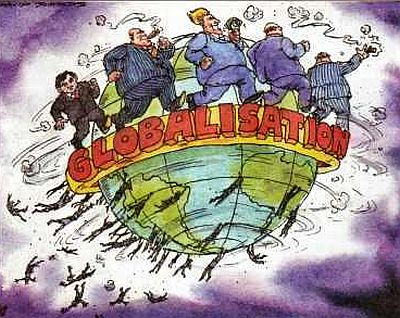
The world economy is approaching the point that according to politicians of different countries can prove to be a dangerous turning point, since the popular uprisings in the U.S. and Europe threaten to destroy the alliances that were formed and strengthened over several decades and which have allowed to establish the mechanisms of free trade and expand economic ties between different countries.
Tensions reached a boiling point in the UK, where in two months must pass the referendum on secession from the EU. The international monetary Fund, which this weekend have completed their annual meetings in Washington, warned that a British exit from the EU is “a real possibility” that could usher in a new era of uncertainty and undermine the already slow recovery of the global economy.
However, such concerns have not only affected the United Kingdom. The party actively campaigning against EU membership, are gaining strength in many European countries, especially in France and Germany, and candidates for presidents of the United States Donald trump (Donald Trump) and Bernie Sanders (Bernie Sanders) opposed the signing of the America of a number of key agreements.
Oil to the flames of industrial workers on both sides of the Atlantic, who feel cast adrift in the rapidly growing international competition. Their discontent led to the creation of political movements in condemning the principles of globalization — free trade and open borders — which are called the path to prosperity since the end of world war II.
“Attempts to turn back the clock, trying to cling to past achievements will lead to sad consequences. Because we can’t do that, ‘ said Hans Timmer (Hans Timmer) leading economist of the world Bank for Europe and Central Asia. — If countries stray from the path of globalization, we will face extremely negative economic consequences.”
The destruction of established economic relations, undoubtedly, will be an extremely difficult process. If the British decide to end the 43-year-old the UK’s membership of the EU, its leaders will have to negotiate with other European countries under the various agreements relating to trade, Finance and social security. The prospect of a British exit from the EU led to the fall in the pound sterling to its lowest level in seven years. As the results of recently conducted surveys, the British have a very different point of view on this issue, and a fairly significant percentage of the population has not yet made a final decision.
Financial markets are preparing for a sharp rise. According to investors, at the moment of voting on the country’s withdrawal from the EU vibrations of the London main stock index may reach 6.5 percent, according to an analysis conducted by Macro Risk Advisors. In April, the Bank of England warned that leaving the EU could lead to further depreciation of the national currency, the reduction in lending and higher interest rates for individuals and companies.
One instability is already enough to undermine the foundations of the current economic growth, but truly the consequences of a British exit from the EU will only become apparent after a few years, when the parties agree on the terms of exit. According to the results of a new study conducted by the analytical center Open Europe, in the case of events worst-case scenario of a British exit from the EU may reduce a country’s economic growth to 2.2 per cent by 2030, however, if the process will run smoothly, it will increase the speed of economic growth in the long term.
This report, however, were not taken into account the potential consequences of withdrawal the UK for other countries-EU members, in which he can provoke the rise of nationalist movements and the economic chain reaction. In France right-wing national front, promised to hold a referendum on the country’s withdrawal from the EU if the result of the presidential election next year will come to power, the candidate from the party. And in Germany the far-right party became the third largest party in the country.
“Now we are experiencing a rather protracted period of uncertainty, we do not understand, what is our world,” said Colin Ellis (Colin Ellis), analyst at Moody’s.
In April the IMF lowered its forecast for the global economy for this year from 3.4% to 3.2% — this is the fourth fall — and even these figures may be overly optimistic. Officials noted that the magnitude of the risks are rising, calling one of them the growth of nationalist sentiment.
“There is a danger that the middle class and poor will be left behind that will turn more than active calls for protectionism and collapse,” — said the head of the IMF Christine Lagarde (Christine Lagarde).
Economists have long argued that the benefits of globalization far exceeds its negative impact on workers, which can replace other workers on the other end of the planet. The IMF and the world Bank are products of the post-war consensus that deeper economic integration can not only help to put an end to political strife, but also lead to inclusive growth.
In many ways, and so it happened. Economists often point to the low prices of clothes and computers, trying to justify their point of view: consumers in developed countries have the opportunity to purchase cheap goods, and workers in developing countries have the opportunity to work and earn a living. According to world Bank estimates, last year the number of people living in poverty fell below 10% of the world population — for comparison, in 1990, in such circumstances, lived a third of the population of the planet.
The world Bank has set a goal to eradicate poverty, defined as the need to live on less than 1.9 dollar a day by 2030, and President of the Bank Jim Yong Kim (Jim Yong Kim) warned that the changing political mood can endanger the successful implementation of this task.
“This movement towards isolationism and free trade is very bad effect on poor people,” Kim said last week in Washington.
However, many supporters of nationalist movements in Europe and the USA are the working middle-aged and elderly, who believe that as a result of globalization they were at the bottom of the economic hierarchy. The level of employment in manufacturing in the United Kingdom fell by about a third since 2000, according to the Organization for economic cooperation and development, whereas in the U.S. this figure fell by 20%.
David Autor (David Autor), economist from the Massachusetts Institute of technology, has analysed the labour exchange in those American cities, where companies had to compete with Chinese imported goods. He found that the unemployment rate has remained high for 10 years and that the income of workers was lower than the national average.
“It seems that all this did not bring any results, — said the chief economist at the IMF Obstfeld Maurice (Maury Obstfeld). The problem lies in the fact that trade creates winners and losers. And while we are unable to find a way to adequately take care of losers.”








